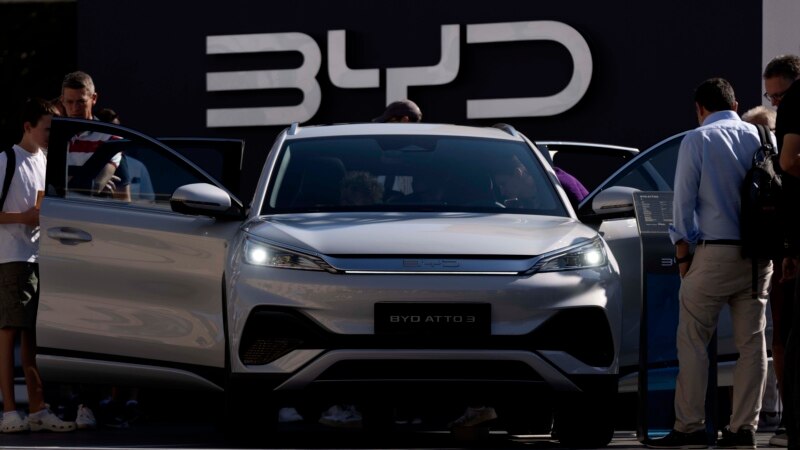
China’s car industry groups have said the country is set to surpass Japan to become the world’s top car exporter for 2023, driven by the Russian market and a growing global appetite for electric vehicles (EVs).
The official China Daily newspaper reported the Association of Automobile Manufacturers on Thursday said China’s vehicle production for the first time reached 30 million units last year, 4.91 million of them exported. The exports are a 58% increase from 2022’s 3.11 million vehicles exported, appearing to overtake Japan as the world’s top car exporter.
Japan’s NHK news agency reported Thursday that the country exported 3.99 million vehicles through November 2023 and was unlikely to catch up with China’s exports when it releases its December export figures.
The Wall Street Journal on Tuesday reported the China Passenger Car Association’s Secretary-General Cui Dongshu citing a jump in demand in the Russian market as a key factor for taking the lead, accounting for about 800,000 of the additional vehicles China exported.
Chinese carmakers were quick to jump on the Russian market after Western auto companies pulled out of the country over Moscow’s 2022 invasion and war on Ukraine.
Chinese customs data shows during the first 11 months of 2023, China’s vehicle shipments to Russia soared 545% from a year ago, to 840,000 units, making it China’s fastest-growing market.
New energy vehicles (NEVs), such as hybrids and electric vehicles (EVs), were also fueling the record production and exports.
The China car manufacturer’s association said Thursday that production of NEVs reached a high of 9.59 million units in 2023, a 36% increase from 2022, accounting for nearly a third of the country’s vehicle production and a quarter of exports. The association said NEV exports reached 1.2 million units, a 77% increase from 2022.
China’s leading EV carmaker, BYD, which is backed by American billionaire Warren Buffett’s Berkshire Hathaway, sold 526,400 of the vehicles in the fourth quarter of last year, for the first time surpassing market leader Tesla’s sales of 484,500 cars in the same period.
Tesla still sold more EVs in all of 2023 than BYD, 1.8 million compared with 1.6 million, but the gap between the Chinese and American EV makers is quickly closing. Tesla has the world’s largest EV car factory in Shanghai, which accounts for more than half its global production.
Analysts credit China’s robust subsidies of NEV makers and buyers for growing the EV industry so quickly and boosting exports.
Paul Triolo, associate partner for China and Technology Policy Lead at the Washington-based Dentons Global Advisors, told VOA the subsidies allowed Chinese firms to focus on design, manufacturing and dominating critical supply chains. “Both the U.S. and EU governments were … late to subsidize and encourage the development of EV battery supply chains, in particular, after some failed efforts a decade ago.”
China began implementing incentive and subsidy policies in 2009 to encourage domestic car companies to focus more on manufacturing EVs, expand charging infrastructure and provide tax exemptions to EV consumers.
Consulting firm AlixPartners estimates that China’s state subsidies for electric and hybrid vehicles will total $57 billion from 2016 to 2022. Beijing in June unveiled tax breaks for new energy vehicles that are expected to amount to more than $72 billion from 2024 to 2027.
Triolo said European and U.S. EV makers are far behind Chinese ones in developing markets.
“Chinese firms will almost certainly dominate markets in the Global South and places like Southeast Asia, and it will be hard for Western automakers to compete in these markets,” he said.
But Chinese EVs are still struggling for market share in Europe and the United States, where domestic EVs dominate. And as China’s EV exports have grown, now accounting for 8% of the European market, Europe and the U.S. have started to respond.
The EU imposes a 10% tariff on imported EVs from China, which can cost 20% less than European brands.
European Commission President Ursula von der Leyen in September noted that global markets were flooded with cheaper Chinese electric cars.
“And their price is kept artificially low by huge state subsidies,” she said. “This is distorting our market.”
Reuters news agency reported Friday that European Commission investigators will in the coming weeks begin inspecting Chinese EV makers as part of a probe into China’s subsidies that could see the EU impose additional tariffs.
Beijing has denounced the move as “naked protectionism.”
The U.S. has a 27.5% tariff on Chinese EVs, but last month the Biden administration indicated it could be raised this year.
And the U.S. announced in December that starting this year, EVs produced in the U.S. with battery components manufactured or assembled in China would no longer qualify for tax credits of up to $7,500.
Analyst Triolo told VOA that imposing tariffs might not prevent Chinese companies from building factories in Mexico — or even the U.S. — to supply the U.S. market.
Triolo also warned that if BYD dominated the Western market, it could pose national security risks similar to those of Chinese telecommunications giant Huawei.
“At one level, a smart EV is just a smartphone on wheels, and [EVs] generate similar levels of concern about data [collection] and sharing, given their sensor suites and onboard computing power.”
Adrianna Zhang contributed to this report.
